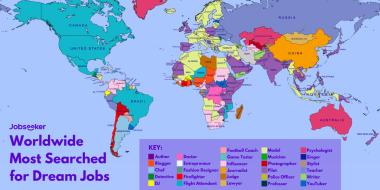Nationality on your resume: Yes or No?
If you live in the United States, mentioning your nationality on your resume is not a requirement, nor is it commonly included in career advice. However, there are scenarios in which it can be beneficial. Learning when to provide this information and when to leave it off is key to helping you land the job you want.

Should you mention your nationality on your resume?
The decision of whether to include your nationality when filling in resume templates is personal and often depends on a number of factors. In some cases, it may be required to confirm your eligibility for a government position. In other cases, it may be preferable because employers would view it as a skill or unique qualification that makes an employee ideal for the position.
However, it is important to mention that, in Western countries like the United States, placing your nationality on your resume is not the norm. In many cases, it is outright discouraged. (Note that this might change depending on the country.) In cultures where applicants expect to get the job based on their skills, abilities, and personality, information such as nationality is often seen as irrelevant.
Some applicants may be hesitant to include nationality in resumes due to anti-discrimination laws. Many countries forbid employers to select applicants based on race, ethnic background, or country of origin. If you place your nationality on your resume in these countries, it can seem as though you don’t know or understand professional standards. This may make the employer question whether you’re the right fit for the job. It may also cause questions about whether an applicant was selected or rejected based on their nationality.
Expert Tip:
When to put your nationality on your resume
Although some applicants may be hesitant about it, there are a few cases when it can be smart to put your nationality on your resume. These are usually situations where it can help to explain another part of your resume or where your nationality makes you uniquely qualified for the position.
Foreign name
If you’re applying for a job abroad, you may have a name that is not common among the people of that nation. If this is the case for you, it can be helpful to include nationality. You can put it on your resume or casually mention it in your cover letter among other information about your professional background. Whatever way you choose to include it, doing so can help answer the questions that may naturally arise.
All work experience abroad
If every job listed on your resume is located in a different country than the company you’re applying to, the hiring manager may start to think that you live abroad. In turn, they may wonder if they’ll have to provide sponsorship or other assistance to help you become qualified to work in their country. Including your nationality or work eligibility can help put the hiring manager’s mind at ease by letting them know it’s not a concern.
If it is required you speak the language of your nationality
Sometimes, speaking the native language of a different country or being familiar with the business landscape in a particular location is a desirable — and sometimes required — skill.
If this is the case for any position you’re applying to, you’ll want to ensure your nationality is displayed prominently, such as in your professional summary or with the rest of your personal details. Also, make sure to highlight in your cover letter how your personal background can help the company succeed.
If the job works with clients of your nationality
If the job you’re applying for has a significant client base that shares your nationality, this information is very relevant to the position and should therefore be included on your resume.
Every company wants to know how you, as an applicant, can help increase sales and better serve customers. If you have a keen understanding of the population the company serves, you’ll stand out as an applicant and have a better chance of being strongly considered for the position.
"Sometimes, speaking the native language of a different country or being familiar with the business landscape in a particular location is a desirable — and sometimes required — skill."
Applying in a country where nationality on resume is normal
Though it isn’t customary in every location, placing your nationality in resumes is expected in some countries. For example, it is a very common practice in South Africa. If you apply for a job there or in another country where most applicants include it, then you should definitely put it on your resume.
In countries like these, not including information about your nationality may seem unprofessional or make you stand out in all the wrong ways in the hiring process.
Government job
When you are applying for a government job, you may be required to share the same nationality as that government. This is because governments want to know that you will represent the country well and prioritize loyalty in all of your affairs.
In this case, not only should you state your nationality and citizenship on resumes, but you also need to check to see whether there are other legal requirements you should highlight, such as special certifications or years spent living in the country.
How to state your nationality on your resume
If you’re wondering what to put for nationality, there are a few approaches you can take. First, you can simply include it with your personal information, such as your name and address. Be aware that doing it this way will make your nationality stand out, as your personal contact information usually goes at the top of your resume.
One other option is to tuck it into your professional summary. If you are applying for a job that requires a specific nationality or a position in which your nationality gives you an edge (such as being a native speaker of a certain language), this is a great way to showcase it along with your other qualifications.
If highlighting your nationality is not your intention, simply include it as a brief footnote at the bottom. You might want to check out a few resume examples to see how others have done it. Always make sure to use the correct terminology (for example, “USA: American”).
When you don’t need to mention your nationality
You don’t need to mention nationality at all on your resume unless you are in a country where including nationality is normal, you are applying for a government job, or you are looking for a job where your nationality or citizenship status is seen as a qualification.
Especially if you’re in a country with anti-discrimination laws, it is usually unnecessary to add your nationality. When you concern yourself with highlighting your skills and experience on your resume, nationality won’t matter as much.
If you need to include it, consider using the extra real estate on your cover letter to explain your living situation or get ahead of any questions about your work eligibility. For example, you may need to highlight that you currently live abroad but are eligible to work in the country where you’re applying for the job.
No matter the situation, all applicants need to remember that the only information you should include on your application materials is what is relevant to the job you’re applying for. Ensuring that only relevant details make it onto your resume not only saves the hiring manager time but also makes you look professional and gives you the best chance of getting your dream job.
Impress potential employers with your resume
Follow step-by-step professional guidance to create a polished resume in minutes.



